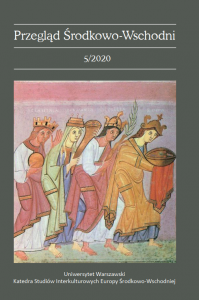Ідэнтычнасць жыхароў Мінска ў XIX – пачатку XX ст.
у святле мемуарнай літаратуры
Identity of the inhabitants of Minsk in the 19th and early 20th centuries in the light of memoirs
Author(s): Viktar KorbutSubject(s): Language and Literature Studies, Studies of Literature, Belarussian Literature
Published by: Uniwersytet Warszawski - Katedra Studiów Interkulturowych Europy Środkowo-Wschodniej
Keywords: Minsk; memoirs; Poles; Belarusians; Jews; Russians; January Uprising
Summary/Abstract: The memories of the inhabitants of Minsk are a very valuable source for understanding the history of the city. Their special value is that they show the life of the city from the inside, with all its contradictions. Residents of Minsk, who considered themselves Poles, constituted a very significant part of its inhabitants until 1863, influenced the life of the city, they maintained these positions, although to a lesser extent, and later – until 1917. In the 19th and early 20th centuries, despite to be part of the Russian Empire, Minsk, as in the previous period, when it was part of the Grand Duchy of Lithuania and the Polish–Lithuanian Commonwealth, was part of the Polish-speaking cultural, mental space. Among the inhabitants of the city, mainly the Catholic faith, but also the Greek Catholic (after 1839 – among part of the Orthodox, former Uniates), gentry and philistines, the language of culture and daily communication was Polish, but at the same time there was an attachment to the traditions of the former Polish–Lithuanian Commonwealth. At the same time, Minsk, or Minsk Lithuanian, was understood as a city in Lithuania – i.e. on the territory of the former Grand Duchy of Lithuania, part of the former Polish–Lithuanian Commonwealth. In this article, based on the memoirs of the then residents and guests of the city – Tadeusz Korzon, Zofi a Kowalewska, Ferdynand Szabłowski, Ferdynand Ruszczyc, Jan Bułhak, Adam Bahdanovič, Anielia Bahdanovič, Mikalaj Ulaščyk and etc. – an attempt was made to reflect their perception of Minsk and the place of the city in the then Lithuania and Byelorussia, Poland and Russia.
Journal: Przegląd Środkowo-Wschodni
- Issue Year: 5/2020
- Issue No: 5
- Page Range: 127-167
- Page Count: 41
- Language: Belarusian

